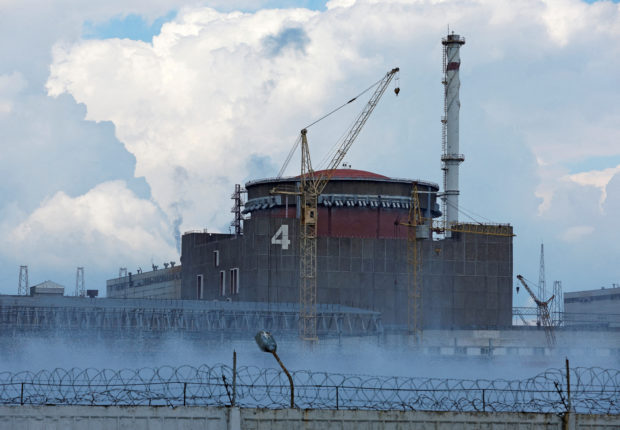Ukraine’s nuclear chief warns of ‘very high’ risks at occupied power plant

A view shows the Zaporizhzhia Nuclear Power Plant in the course of Ukraine-Russia conflict outside the Russian-controlled city of Enerhodar in the Zaporizhzhia region, Ukraine August 4, 2022. REUTERS FILE PHOTO
KYIV — The head of Ukraine’s state nuclear power firm warned on Tuesday of the “very high” risks of shelling at the Zaporizhzhia nuclear power plant in the Russian-occupied south and said it was vital Kyiv regains control over the facility in time for winter.
Energoatom’s chief, Petro Kotin, told Reuters in an interview that last week’s Russian shelling had damaged three lines that connect the Zaporizhzhia plant to the Ukrainian grid and that Russia wanted to connect the facility to its grid.
Ukraine and Russia have accused each other of shelling the site of the vast nuclear power station – Europe’s biggest – that lies in Russian-controlled territory, in recent days.
Some of the shelling landed near storage facilities for spent fuel, an area that has 174 containers of highly radioactive material, Kotin said, warning of the dangers of them being hit.
“This is … the most radioactive material in all the nuclear power plant. This would (mean) the distribution (of it) around this place and then we will have like a radiation cloud and then the weather will decide… which direction the cloud goes,” he said.
Article continues after this advertisement“The risk is very high,” he said.
Article continues after this advertisementKotin said Russia wanted to connect the plant to its grid, a technically difficult process that requires the facility to be severed from the Ukrainian system before it can be gradually connected to the Russian one.
“Their plan is to damage all the lines from the Zaporizhzhia nuclear power plant. After that it will not be connected to the Ukrainian power system,” he said.
The nuclear plant has six reactors and produced 20-21% of Ukraine’s electricity needs before the war, he said. It urgently needs renovations carrying out at it, he added.
“… so for winter season we urgently need to remove these Russians from there, then to renovate infrastructure,” he said.
Around 500 Russian troops are currently at the facility with heavy vehicles, and the plant is being used as a base, he said.
Kotin said the best solution would be for Russian troops to withdraw and for the plant to be returned to Ukrainian control. Peacekeepers could be sent in to guard the facility, he said.
“The ultimate solution is to remove soldiers and all their weaponry from the site. And this completely solves the problem of safety at the Zaporizhzhia power plant,” he said.
He warned, however, there would be no safety guarantees for any inspectors from the International Atomic Energy Agency if they were to travel to the site, which was occupied in March.
That kind of trip would be best conducted with the United Nations, he said.
RELATED STORIES
Macron and Johnson pledge again to support Ukraine as long as necessary
Two more grain ships sail from Ukraine as third port opens
One killed as blasts rock Russia base in Crimea, Kyiv not taking responsibility
Kyiv urges travel ban on Russians as Moscow steps up assault in eastern Ukraine